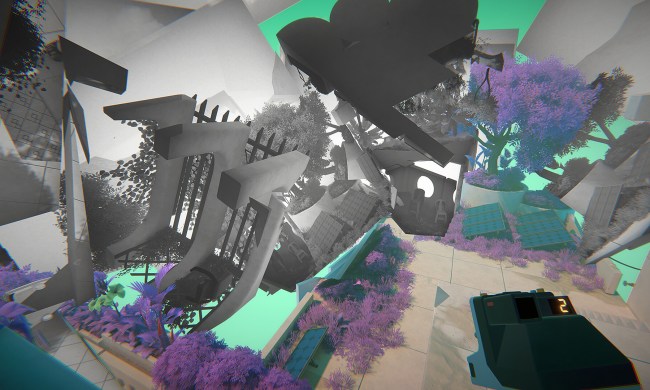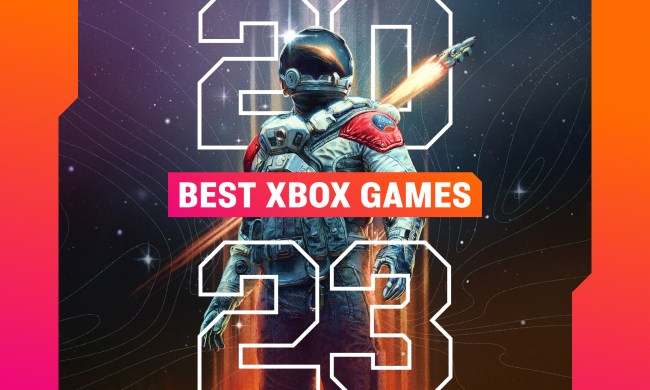Forget Christmas; last week, we got a second Summer Game Fest thanks to a few days of high-profile announcements. That includes the first trailer for Grand Theft Auto VI and a three-and-a-half hour Game Awards broadcast that revealed upcoming titles like Monster Hunter Wilds and Arkane’s Blade. I wouldn’t blame anyone who wasn’t able to keep track of every single announcement offered up in the span of three days.
There’s one showcase, though, that’s worth revisiting. Day of the Devs, a live broadcast that routinely highlights independent games, returned last week with a showcase full of announcements. Titles like Flock and Resistor gave a wide picture of the diverse, creative games brewing in the ever-busy indie scene. To punctate that celebration, Day of the Devs held a public event in Los Angeles the day after The Game Awards, where players could try out over 40 games shown off during the stream.
Digital Trends attended the bustling show, going hands-on with over a dozen upcoming titles. They ranged from oddball horror games about evil landlords to a playable documentary about video game legend Jeff Minter. While we didn’t get to try every game (titles like the surreal Dome-King Cabbage were such crowd hits that it was difficult to get hands-on), we did play enough to get a sense of how many strange and wonderful worlds small developers have brewing. These were just a few of our favorites we played at Day of the Devs. If you’re interested, you may want to consider wish-listing them on platforms like Steam.
Flock
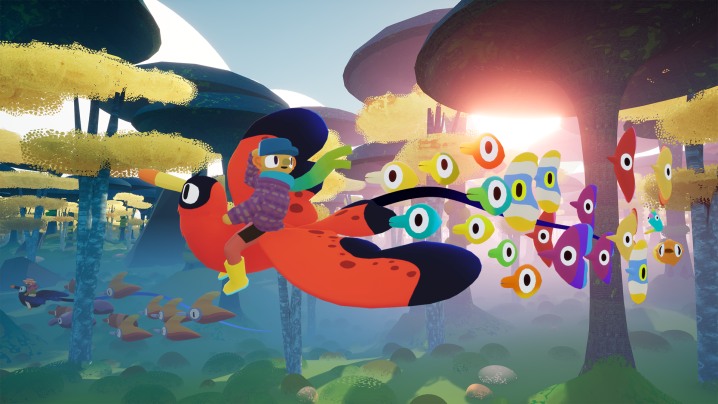
Flock is one of those games that feels like it was built entirely for me, an amateur birdwatcher. Created by the team behind Wilmot’s Warehouse and I Am Dead, it’s essentially a nature-classification game. In my demo, I’d hop on the back of a colorful bird and sail through the clouds to a small island. From there, I could study all sorts of quirky alien creatures and try to correctly identify and classify them by species. It’s a relaxing gameplay loop punctuated by some great jolts of animal comedy. While my demo would only give me a taste of its central progression, tasking me with identifying a certain number of creatures or courting them to fly alongside me, that was enough to know I’ll be taking to the skies when it launches next spring.
Resistor

Inspired by classic PS2 games like Burnout, Resistor is a unique mash-up of an arcade racer and narrative adventure. The pre-alpha demo I played would drop me in a canyon where I’d be free to zip around winding paths en route to the next story destination. While driving, I could launch off ramps, boost to reach far-off paths, or even bash into other vehicles, prompting a satisfying slow-motion takedown. For a game that’s only been in development for less than two years, Resistor already feels remarkably fast and fun. Driving feels like a solid throwback to arcade racing classics, while its cel-shaded art style gives it a colorful jolt of modern flair. If you love driving games, but want one with a little more meat, Resistor seems prepared to deliver.
Llamasoft: The Jeff Minter Story
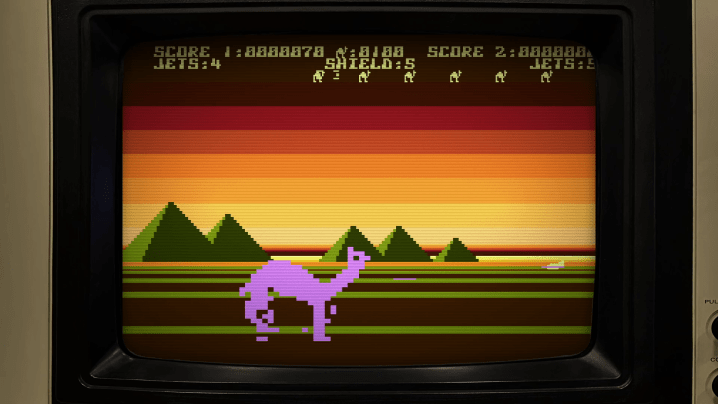
Digital Eclipse cracked the video game documentary this year with The Making of Karateka. That title told the story of Jordan Mechner’s Karateka through creative interactive storytelling that hammered home why the creative process needs criticism. The studio’s next game might be even more insightful. Llamasoft: The Jeff Minter Story is a much broader documentary about the titular designer that includes dozens of his games in playable form, along with tons of archival material. It’s an impressive increase in scope, but what I’m really excited about is its approach to narrative. Digital Eclipse’s Chris Kohler tells me that Llamasoft will talk about an artist with outside-the-box ideas trying to work within an industry interested in safe profit. That should make for a distinct story about the video game business that stands apart from Karateka.
Kind Words 2 (lofi city pop)
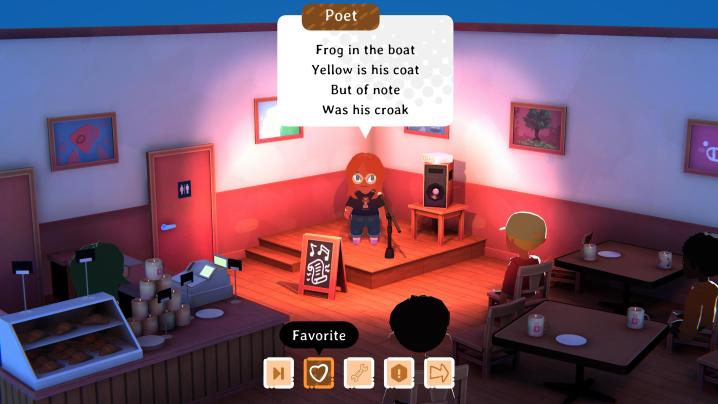
If you asked me to guess a game that would never get a sequel prior to Day of the Devs, I probably would have said Kind Words. The social letter-writing game seemed like an elegantly simple concept that didn’t need much expansion. And yet, Kind Words 2 (lofi city pop) has me eating my words. The sequel creates a wider social space for players, including spots where they can share poetry with others, recommend their favorite media, or send words of wisdom out into the world. But what really sold me was something much weirder: the Wiggly Void. The new feature lets players write anything they want and feed it to a friendly tentacle monster, who immediately deletes it. It’s a “scream into the abyss” feature, and I can’t tell you how much I plan to use that. Little details like that make Kind Words 2 feel like a worthy expansion for those who need a safe space to let out their emotions.
Home Safety Hotline
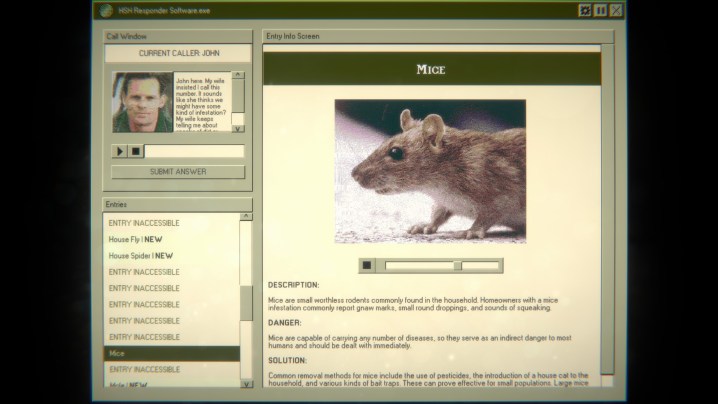
When I sat down to demo Home Safety Hotline, a call center simulator set entirely within a 1990s internet app, the dev team on hand asked if I’d like to start fresh or continue where the last demoist left off. I decided to go with the latter and they warned me that I might have to deal with some angry callers. I share that background as a reason why it was not my fault when I was eventually fired from my job and turned into a rat. That bizarre fate perfectly explains Home Safety Hotline‘s deal. During my demo, I’d have to answer calls from worried homeowners who needed help identifying issues in their houses. They’d explain the problem and I’d cross-check a guide full of common problems, hopefully giving them the correct advice. Pests range from mice to spiders to goblins that come out at night and clean your apartment — you know, the ususal. It was an engrossingly bizarre demo that bounced between oddball comedy and surrealist horror inspired by European folklore. I may have gotten fired on my first shift, but that won’t stop me from applying again when the full game drops.
Hermit and Pig

Of all the subjects you could build a game around, “truffle pig RPG” is certainly a head-turning concept. Hermit and Pig delivers on the surprising idea with a charming adventure about a recluse and his piggy pal foraging through the woods for mushrooms. While my demo wouldn’t go deep into story, it would introduce me to the RPG’s unique combat system that plays like a mix of Paper Mario and Earthbound. Each attack requires me to input a certain button sequence before a timer runs out. Sometimes I can inflict bonus damage by letting the timer hit a certain point before hitting enter. It’s a more active turn-based combat system that has me memorizing short button inputs and experimenting with what works best against forest pests like flies. Above all else, though, it’s just nice to have a pink little companion who can dig up truffles. What a pal.
Cryptmaster
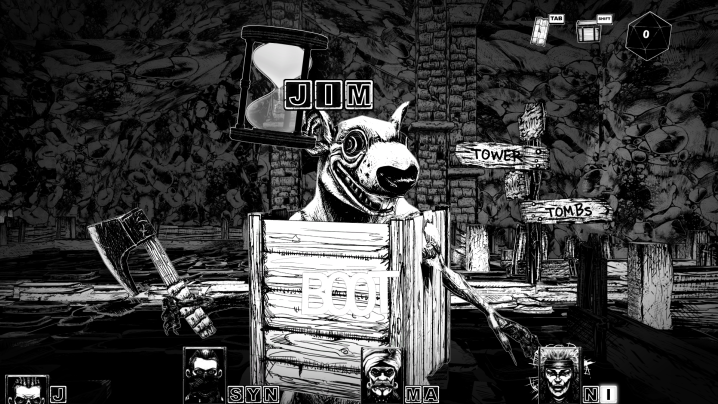
Earlier this year, I demoed several indies at a Day of the Devs event at the Game Developers Conference. One game I wasn’t able to try, though, was Cryptmaster. The unique dungeon-crawling typing game was a popular attraction at the show, drawing lines from curious attendees. After finally getting a chance to try it at this past weekend’s showcase, I can understand that attention. The ingenious indie had me exploring a black-and-white dungeon while typing out words to solve puzzles or attack enemies. Anytime I opened a treasure chest, I’d have to guess what was inside by typing commands like “lift” or “listen” to get clues. It was an impressive magic trick, as it really feels like the demonic narrator that followed me around was actively responding to my inputs. Considering how fascinated people seem with AI chatbots these days, I imagine that technical feat will make Cryptmaster a timely curiosity when it launches.
Thank Goodness You’re Here
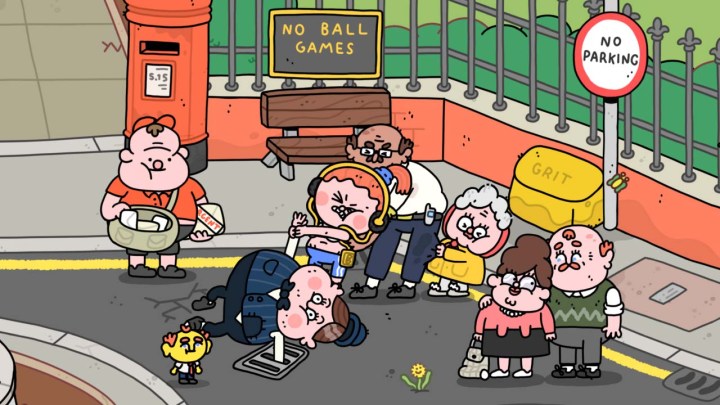
I love a good comedy game and Thank Goodness You’re Here seems to be exactly that. The cartoon adventure had me walking around a small town, solving everyone’s problems. It’s a slice of absurdism pulled straight from the Monty Python playbook. One puzzle had me following a gardener’s hose into a well to turn it on. When I got there, I’d find myself in dropped into a shop window display, where I could stick cigarettes into fishes’ mouths. Later, I’d jump onto the counter of a food truck and smack the cashier’s enormous bum, causing him to close the shop due to “smacky bum bum.” Everything I experienced in the short slice signaled a delightfully goofy game filled with unpredictable gags.
That’s only a taste of what we saw. From the personal Last Time I Saw You to the absolutely wild Janet DeMornay is a Slumlord (and a Witch), there’s a wealth of creative indies on the horizon. There’s a whole lot to look forward to beyond Grand Theft Auto VI.


